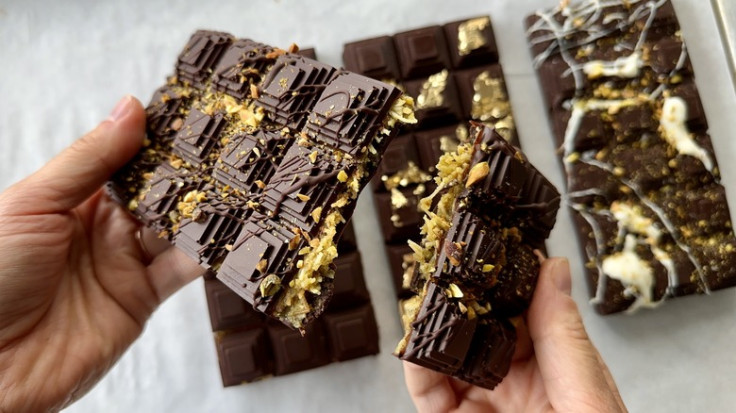Viral Dubai Chocolate Hits UK Shelves for £5, While Customers Brand £1 Cadbury Bar 'Vile'

The viral 'Dubai chocolate' has finally arrived in UK supermarkets, sparking excitement among shoppers and flying off the shelves at record speed. With its rich Middle Eastern flavours and indulgent fillings, this luxury treat has captivated food lovers worldwide—thanks, in part, to its immense popularity on social media. TikTok has been flooded with ASMR videos and rave reviews, fuelling long queues as eager customers rush to get their hands on the latest must-have confection.
Meanwhile, another recent arrival in UK stores, a Cadbury chocolate bar imported from New Zealand, has faced a much frostier reception. Priced at just £1, the Perky Nana bar has been widely criticised, with customers branding its banana-flavoured filling 'vile' and 'sicky.' The contrast in reception has raised questions about the changing tastes of UK consumers and the power of online hype.
Dubai Chocolate: What's All the Fuss About?
The viral 'Dubai chocolate' is a luxurious blend of crispy kataifi, tahini paste, and Middle Eastern flavours like pistachio and konafa. Some bars even include unique fillings such as filo pastry, vanilla custard, or tea and biscuits, all encased in rich milk chocolate. Due to its intricate composition and high-quality ingredients, bars by the brand Flair are retailing for £4 to £5 each at Morrisons.
While its decadent flavours are a key selling point, much of its appeal stems from its social media success. The ASMR-friendly texture and distinctive crunch have made it a viral sensation, with influencers driving demand through engaging food reviews and unboxing videos.
When Social Media Translates to Retail Frenzy
Dubai chocolate's meteoric rise has been largely driven by TikTok, where influencers showcase its unique textures and satisfying snap. Lindt's 'Dubai Style' flavour gained over 90 million views, prompting queues of up to 10 hours. Another viral influencer, Maria Vehera, amassed more than 114.6 million views on a FIX konafa-flavoured bar, further propelling demand.
The creator of the original 'Dubai chocolate' has credited these viral videos with its global success, highlighting the increasing influence of social media in shaping food trends.
The Origins of 'Dubai Chocolate'
Remarkably, the now-iconic 'Dubai chocolate' was born out of a pregnancy craving. In 2021, British-Egyptian entrepreneur Sarah Hamouda was expecting her second child and found herself dissatisfied with available desserts. Experimenting in her kitchen, she and her husband combined chocolate with Middle Eastern-inspired fillings like pistachio and konafa, ultimately crafting a bar that was rich, crunchy, and bursting with nostalgic flavours.
Recognising its potential, the couple launched their business, FIX Dessert Chocolatier, in 2022. Hamouda explained in an interview with Falstaff: 'I wanted to create chocolate bars that combined different textures and flavours, leading to the concept of "extra-filled" bars that offer a satisfying and rich experience. Each flavour is designed to remind you of something special from your past or even present, while the diverse textures and high-quality ingredients make each bite memorable.'
Her dedication to achieving the perfect balance of flavour and texture has clearly resonated with consumers, though the same cannot be said for all recent chocolate imports.
Cadbury's Perky Nana Faces Backlash
In stark contrast to Dubai chocolate's triumph, Cadbury's Perky Nana bar has been met with disappointment. The banana-flavoured chocolate, a New Zealand import, is being sold for just £1 at B&M, but UK consumers are unimpressed.
A Facebook post in the group Dansway Gifts and Bargains UK attracted over 1,000 comments on the product, with opinions sharply divided. Some found the artificial banana taste unbearable, describing it as 'weird and sicky,' while others criticised its overly chewy texture. One user bluntly remarked: 'Just the thought makes me gag,' while another labelled it 'mingin' and 'vile.'
Similar complaints have been made about another Cadbury import, Pink Lemonade Dairy Milk. Marketed as a chocolate bar with a raspberry and lemon filling, the product left many consumers unimpressed, with some unable to taste either flavour distinctly.
A Divided Verdict on Imported Chocolates
Despite the widespread criticism, not everyone is against the Perky Nana. Metro deputy editor Claire Wilson found it 'delicious,' comparing it to the nostalgic Texan bars of the 1980s. Others described it as 'lush' and likened it to softer foam bananas.
The contrasting fortunes of Dubai chocolate and Cadbury's Perky Nana highlight a shift in UK consumer preferences. Shoppers are increasingly drawn to high-quality, innovative treats with unique textures and flavours, particularly those backed by strong social media hype. Meanwhile, mass-produced imports with artificial flavours and inconsistent quality are struggling to gain traction.
As the food industry continues to evolve, one thing is clear: UK consumers are looking for more than just sweetness—they want excitement, craftsmanship, and a truly indulgent experience. If brands fail to deliver, the market's verdict will be swift and unforgiving.
© Copyright IBTimes 2025. All rights reserved.





















